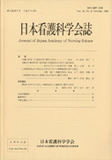Japanese
English
- 販売していません
- Abstract 文献概要
- 参考文献 Reference
- サイト内被引用 Cited by
要旨
看護業務の安全性を高める方策を考察する目的で,与薬業務に焦点をあて,与薬ミス発生状況や確認・対処行為と,病棟特性(業務環境)および看護婦特性との関連をみた.病床規模約650床のA大学病院と約150床のB私立病院で,看護婦を対象にした質問紙調査を実施した(回収率約70%).病棟全体の状況については婦長を対象に質問紙調査を行なった.調査の結果,病棟婦長が把握していない与薬ミスが相当数あることが明らかとなった.A病院一般診療科の155名中56%が過去1か月間に与薬ミス・ニアミスを体験しており,30%が与薬ミスに対処した経験を持っていた.与薬ミス・ニアミスの発生に対しては「看護必要度が高い患者の割合」と「病床利用率」が影響を及ぼしていた.「看護婦の教育背景」は,与薬ミスの確認行為と対処行為の両者と関連があった.A病院のICUと,B病院のICUを含む混合病棟における与薬ミス・ニアミスは,看護婦あたりでは同程度であったが,患者あたりではA病院ICUの方が多かった.
Abstract
The purpose of this paper is to reveal factors that may occur or that may prevent medication errors, and to consider some measures of patients' safety. For this aim, we explored the characteristics of each ward and the characteristics of each nurse as well as their experiences about medication errors.
The investigation was conducted at a approximately 650-bed university hospital located in a large urban center in Tokyo, and at a approximately 150-bed private hospital located in a suburb of Tokyo. Questionnaires were distributed in October 1991 and asked nurses to identify medication errors in which they had been personally committed within the past one-month. A response rate was approximately 70%. We were informed other information of each unit from head nurses-such as the unit size, case mix, nurse staffing and working schedule of nurses.
Results indicate that on the questionnaires the nurses reported 10 times medication errors than they reported to head nurses. 56 percent of 155 nurses (except nurses who were working at an ICU and a mental ward) stated they had made medication errors or near misses during the 1-month reporting period. 30 percent of 155 stated they actually dealt with medication errors occurred by others.
Several factors that effect medication errors have been identified by a stepwise discriminant analysis. The proportion of serious patient and the bed occupancy rate influenced the occurrence of medication errors. The educational career of a nurse, especially whether the nurse had been offered an assistant nursing program or not, related to dealing with and/or preventing medication errors. Although the number of medication errors per nurse of the ICU in the university hospital was almost the same as that of the unit including ICU beds in the private hospital, but approximately 10 times more medication errors and near misses per patient were reported in the former than in the later.
Several limitations of this study dictate that the results be applied with caution. However, it may be helpful in preventing medication errors to lighten the burden of nurses, and to enlighten nurses on this subject.
Copyright © 1993, Japan Academy of Nursing Science. All rights reserved.


